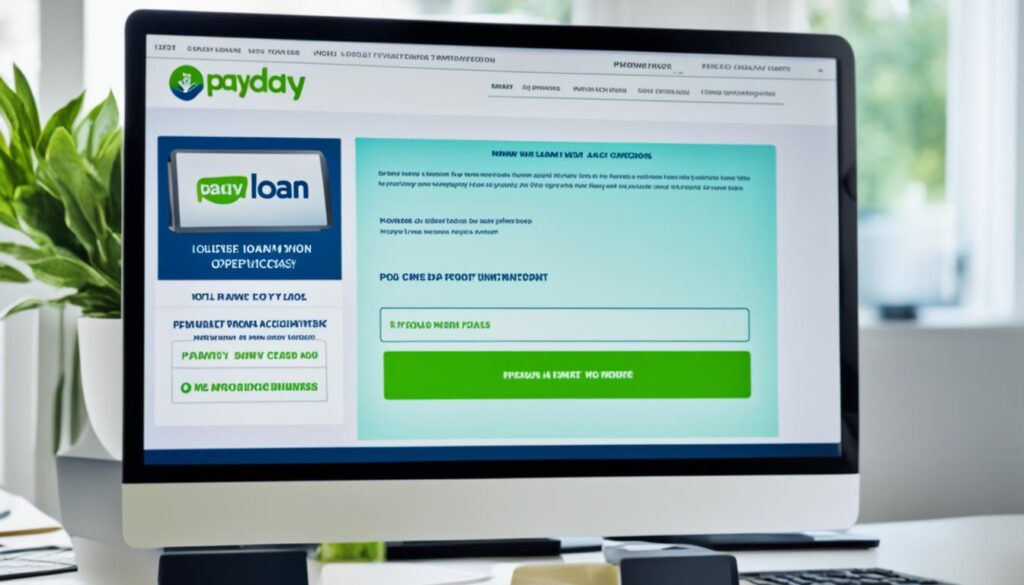Payday loans, also known as cash advances, are short-term, high-interest loans designed to provide quick cash to consumers until their next paycheck. These loans can be obtained from various payday lenders, both online and in physical locations. While payday loans offer an accessible way to borrow money, there are several factors that borrowers should consider before applying.
Before proceeding with a payday loan, it’s important for borrowers to understand the terms and conditions associated with this type of loan. This includes the interest rate, loan amount, and repayment terms. Payday loans typically have a high interest rate due to their short-term nature and the minimal credit check process involved. Borrowers should carefully evaluate whether they can comfortably repay the loan within the specified timeframe.
Additionally, borrowers should be aware of the potential consequences of payday lending. The Consumer Financial Protection Bureau (CFPB) has raised concerns about the risks associated with payday loans, such as the possibility of falling into a cycle of debt. It is essential to assess the financial impact and consider alternative options before pursuing a payday loan.
Understanding your own financial situation and alternatives to payday loans can help you make an informed decision. Exploring options such as personal loans from banks or credit unions, borrowing from friends or family, or seeking assistance from non-profit organizations can provide more favorable terms and prevent the potential risks associated with payday loans.
Ultimately, responsible borrowing involves careful consideration of your financial health and the potential impact of loan repayment on your credit score. By understanding the risks, exploring alternatives, and seeking advice when needed, borrowers can make informed financial decisions.
Key Takeaways:
- Payday loans provide quick cash but come with high interest rates and short repayment terms.
- Borrowers should consider their ability to repay the loan and explore alternatives before applying for a payday loan.
- Understanding the terms and conditions, as well as potential consequences, is essential for responsible borrowing.
- Exploring alternatives, such as personal loans from banks or credit unions, can provide more favorable terms.
- Seeking financial advice and support from reputable organizations can help borrowers make informed decisions.
Basic Requirements for Payday Loans
When considering a payday loan, it’s important to understand the basic requirements that borrowers need to meet. Payday loans are designed to provide quick cash to individuals facing urgent financial needs. To qualify for a payday loan, borrowers typically need to fulfill the following criteria:
- Source of Income: Borrowers are required to have a steady source of income, which could include employment, social security benefits, or other regular income streams.
- Checking Account: A checking account is necessary to facilitate the loan transaction. Most payday lenders require borrowers to have an active checking account where the loan funds can be deposited and the repayment can be withdrawn.
- Valid Identification: Borrowers must provide valid identification to verify their identity and age. This can include a driver’s license, passport, or other government-issued ID.
The application process for payday loans is typically quick and convenient. Borrowers can apply online or in-store, and the approval decision can often be made within minutes. It’s important to note that, in many cases, borrowers are required to provide a postdated check or authorize a withdrawal from their checking account for the loan amount plus a lending fee.
Understanding these basic requirements is essential for individuals considering payday loans. It’s crucial to ensure that you meet these criteria before applying, as it can impact your eligibility and the likelihood of loan approval.
| Requirements | Description |
|---|---|
| Source of Income | Borrowers must have a regular source of income, such as employment or benefits. |
| Checking Account | A valid checking account is necessary for loan disbursement and repayments. |
| Valid Identification | Borrowers must provide valid identification to verify their identity and age. |
Payday Loan Interest Rates
When considering a payday loan, it’s crucial to understand the interest rates associated with these types of loans. Payday loans often come with extremely high interest rates, with annual percentage rates (APRs) that can exceed 500% or even 1,000%. These rates make payday loans one of the most expensive ways to borrow money.
The cost of payday loans can vary depending on state regulations, but they consistently carry high-interest rates that borrowers should be aware of. The loan amounts for payday loans typically range from $50 to $1,000, depending on state regulations. However, it’s important to note that the loan duration for payday loans is usually short, often lasting until the borrower’s next payday.
Given the high interest rates and short loan duration, borrowers should carefully consider whether a payday loan is the best option for their financial needs. Exploring alternative borrowing options and understanding the potential financial implications of payday loans is essential for making an informed decision.
It’s also worth noting that payday lending regulations can vary from state to state. Some states have implemented stricter regulations or outright banned payday loans due to their high-risk nature. Understanding the specific regulations in your state can help you make an informed decision about whether to pursue a payday loan.
Risks of Payday Loans

While payday loans may offer a quick solution for those in need of immediate cash, they come with significant risks that borrowers should carefully consider before applying. Failure to understand and manage these risks can lead to financial trouble and a cycle of rising debt.
High Fees and Rising Debt
One of the major risks associated with payday loans is the high fees charged by lenders. When borrowers are unable to pay off their loan in full on the due date, they may be required to extend the loan by paying additional fees. This can result in a cycle of debt where the borrower finds themselves continuously borrowing to cover the fees, leading to an ever-increasing amount owed. The fees charged for each extension can quickly add up, making it challenging to break free from the debt cycle.
Payday Lending Regulations
Payday lending regulations vary from state to state, and in some states, payday loans are even banned. These regulations are in place to protect consumers from predatory lending practices and excessive interest rates. However, even in states where payday loans are legal, the high-interest rates and fees associated with these loans can still put borrowers at risk of financial trouble.
| Banned States | Rising Debt | Fees |
|---|---|---|
| Arkansas | Tennessee | Wyoming |
| Connecticut | Utah | Alabama |
| Georgia | South Carolina | Arizona |
Note: Payday loans are banned in certain states due to their high-risk nature.
It’s crucial for borrowers to be aware of the regulations in their state and understand the risks associated with payday loans. Ignoring these risks can lead to significant financial trouble and have long-lasting consequences on one’s overall financial wellbeing.
“Payday loans can be deceivingly convenient, but borrowers should carefully consider the risks associated with high fees and rising debt before taking out these loans.” – Financial Expert
Instead of relying on payday loans, borrowers in need of emergency funds should consider exploring alternative options such as seeking assistance from local credit unions or applying for personal loans from traditional lenders. These alternatives often come with lower interest rates and more favorable terms, helping to avoid the risks associated with payday loans.
By understanding the risks, exploring alternative options, and making informed financial decisions, borrowers can protect themselves from falling into a cycle of debt and maintain their financial health.
Alternatives to Payday Loans

When faced with financial emergencies, borrowers often turn to payday loans as a quick solution. However, payday loans come with high interest rates and unfavorable terms, which can lead to a cycle of debt. It’s important to explore alternatives that offer more favorable options for borrowers in need. Here are some alternatives to consider:
1. Credit Union Personal Loans
Credit unions are member-owned financial institutions that offer personal loans as an alternative to payday loans. Unlike payday lenders, credit unions are not-for-profit and typically offer lower interest rates and fees. They prioritize their members’ financial well-being and provide personalized assistance to borrowers, even those with bad credit. Credit unions are an excellent option for individuals seeking fair and affordable short-term loans.
2. Traditional Lenders
Traditional lenders, such as banks and online lending platforms, also provide personal loans that can serve as alternatives to payday loans. These lenders often have more lenient eligibility criteria and offer loans with lower interest rates compared to payday lenders. If you have a good credit score, you may qualify for a personal loan with favorable terms and repayment options.
3. Emergency Funds
Another alternative to payday loans is utilizing emergency funds. It’s essential to build an emergency fund to cover unexpected expenses and financial emergencies. If you have savings set aside for emergencies, you can use these funds instead of relying on payday loans. Emergency funds provide a secure and interest-free way to handle unexpected financial situations.
4. Short-Term Loans
Short-term loans offered by reputable lenders can be an alternative to payday loans. These loans typically have lower interest rates and more flexible repayment terms compared to payday loans. Short-term loans can provide the necessary funds to cover immediate expenses without trapping borrowers in a cycle of debt. It’s important to compare different lenders and carefully review the terms before borrowing.
| Loan Type | Interest Rates | Repayment Terms | Eligibility Criteria |
|---|---|---|---|
| Credit Union Personal Loans | Low | Flexible | Varies by credit union |
| Traditional Lenders | Lower than payday loans | Flexible | Good credit score may be required |
| Emergency Funds | No interest | No repayment terms | Depends on individual savings |
| Short-Term Loans | Lower than payday loans | Flexible | Varies by lender |
Table: Comparison of Alternatives to Payday Loans
By exploring these payday loan alternatives, borrowers can access funds more responsibly and avoid the high costs associated with payday loans. It’s crucial to carefully review the terms and conditions of any loan and consider the impact on your financial health before making a decision.
Responsible Borrowing and Financial Health

When it comes to maintaining financial health, responsible borrowing is paramount. Before deciding to take out a payday loan, borrowers should undertake a careful assessment of their ability to repay the loan. Defaulting on a payday loan can have severe consequences, including a negative impact on credit scores, making it more challenging to obtain future loans.
High-interest loans, such as payday loans, often come with substantial risks and can lead to a cycle of debt if not managed properly. It is crucial for borrowers to consider alternatives to high-interest loans to maintain financial stability. Exploring options like credit unions, personal loans, or emergency funds can provide more favorable terms and lower interest rates, offering a safer and more manageable borrowing solution.
Benefits of Responsible Borrowing
Responsible borrowing not only helps individuals maintain their financial well-being but also safeguards against the detrimental effects of high-interest loans. By making informed borrowing decisions, individuals can protect their credit scores, access better loan terms in the future, and avoid falling into a cycle of debt.
One of the key aspects of responsible borrowing is understanding the importance of repaying the loan on time. Making timely payments demonstrates financial responsibility and can positively contribute to one’s credit score. In contrast, late payment or defaulting on a loan can significantly damage an individual’s credit history, making it challenging to qualify for future loans, secure employment, or even rent a home.
Improving Credit Scores through Responsible Borrowing
Responsible borrowing includes being conscious of credit scores and working towards improving them. A credit score is a measure of an individual’s creditworthiness and plays a vital role in determining loan eligibility and interest rates. By repaying loans as agreed and avoiding delinquencies, borrowers can positively impact their credit scores.
It is essential to note that payday lenders may conduct a credit check during the application process. While these lenders often focus less on credit history and more on income and employment, a credit check can still impact credit scores. Therefore, responsible borrowing involves managing credit checks effectively and minimizing their frequency to protect one’s credit profile.
Responsible borrowing not only benefits individual borrowers but also promotes overall financial health in society. By educating oneself about financial literacy, exploring alternative borrowing options, and practicing responsible repayment habits, borrowers can build a stronger foundation for their financial well-being.
| Advantages of Responsible Borrowing | Effects of High-Interest Loans |
|---|---|
| Builds and improves credit scores | Can lead to a cycle of debt |
| Access to better loan terms in the future | Negative impact on credit history |
| Enhances financial stability and well-being | Difficulty in obtaining future loans |
Protecting Your Personal Information

When applying for an online payday loan, it’s crucial to prioritize the protection of your personal information. Your Social Security number, checking account number, and other sensitive details must be safeguarded. To ensure the security of your personal information:
- Verify that the lender or website has clear privacy policies in place. These policies should outline how your information will be collected, used, and protected.
- Read the privacy policy carefully and look for any red flags or concerns. Ensure that the policy aligns with industry-standard practices and follows relevant regulations.
- Look for indications that the lender uses encryption technology to protect your data. This is crucial for keeping your information secure during transmission.
- Be aware that some online lenders may pull a credit report as part of the loan application process. Understand how your credit information will be used and shared, and only provide it to reputable lenders.
- Consider regulated lenders, as they are subject to oversight and regulation, which helps ensure the protection of your personal information.
- If you have any concerns about privacy or the security of your personal information, contact the lender directly and ask for clarification.
- By taking these precautions and being mindful of the privacy policies in place, you can help protect your personal information when applying for an online payday loan.
Remember, your personal information is valuable and should be treated with the utmost care. By choosing reputable lenders, understanding and following privacy policies, and staying informed about credit reporting practices, you can safeguard your personal information throughout the online payday loan application process.
Protect Your Personal Information: A Responsible Borrower’s Guide
When applying for an online payday loan, it’s crucial to prioritize the protection of your personal information. Your Social Security number, checking account number, and other sensitive details must be safeguarded. To ensure the security of your personal information, follow these guidelines:
- Verify that the lender or website has clear privacy policies in place to protect your personal information.
- Read through the privacy policies carefully and ensure they align with industry-standard practices.
- Look for indications that the lender uses encryption technology to protect your data during transmission.
- Be aware that some lenders may pull a credit report during the application process. Understand how your credit information will be used and shared.
- Choose regulated lenders, as they are subject to oversight and regulation, providing an added layer of protection for your personal information.
By following these guidelines, you can safeguard your personal information when applying for an online payday loan.
| Protecting Your Personal Information: Best Practices | |
|---|---|
| Verify Privacy Policies | Ensure that the lender or website has clear privacy policies in place. |
| Read and Understand Policies | Thoroughly read and understand the privacy policies to ensure they align with industry-standard practices. |
| Encryption Technology | Look for indications that the lender uses encryption technology to protect your data. |
| Be Informed About Credit Reports | Understand how your credit information will be used and shared. |
| Choose Regulated Lenders | Opt for lenders that are regulated for added protection. |
Understanding the Importance of Privacy Policies and Personal Information Protection
When applying for an online payday loan, protecting your personal information is crucial to prevent unauthorized access and potential fraud. Here are some best practices:
- Verify the presence of clear and transparent privacy policies on the lender’s website.
- Take the time to read and understand the privacy policies to ensure your information remains confidential.
- Choose lenders who utilize encryption technology to protect your sensitive data.
- Be aware that some lenders may pull a credit report as part of the application process, and only provide your information to reputable lenders.
- Consider regulated lenders who follow strict privacy policies and are subject to oversight and regulation.
By following these best practices, you can safeguard your personal information and ensure a secure online payday loan application experience.
Understanding Loan Terms and Conditions

Before accepting a payday loan, borrowers should carefully read and understand the terms and conditions of the loan agreement. It is important to be fully informed about the loan terms, including the repayment schedule, interest rates, fees, and any penalties or charges that may apply.
Payday lenders are regulated credit providers, and it is essential to ensure that the lender is properly licensed and regulated in your state. This helps protect consumers from predatory lending practices and ensures that the lender follows the necessary guidelines and regulations.
“Understanding the loan terms and conditions is crucial to make an informed decision and avoid any surprises or misunderstandings later on. Take the time to review the agreement and ask questions if there’s anything you don’t understand.”
Loan terms and conditions can vary from lender to lender, so it is important to carefully review all the details before making a decision. This may include the loan amount, repayment period, interest rates, any applicable fees, and the consequences of defaulting on the loan.
Loan Terms and Conditions Checklist:
- Loan Amount: Determine the exact amount you can borrow and if it meets your needs.
- Repayment Period: Understand the duration of the loan and when repayment is due.
- Interest Rates: Know the APR (Annual Percentage Rate) being charged and the total cost of borrowing.
- Fees: Identify any additional fees such as origination fees, late payment fees, or early repayment penalties.
- Default Consequences: Be aware of the potential repercussions of failing to repay the loan on time.
By carefully reviewing the loan terms and conditions, borrowers can make an informed decision that aligns with their financial situation and goals. Remember, you are under no obligation to accept any loan offer.
Understanding loan terms and conditions is an important step in responsible borrowing and maintaining financial health. Being well-informed helps borrowers avoid unnecessary risks and make choices that align with their needs and circumstances.
Seeking Financial Advice and Support

If borrowers find themselves in extensive debt or need financial advice, it is essential to seek assistance from reputable organizations that specialize in debt management. These organizations provide valuable guidance and support to individuals struggling with their financial situations.
One such organization is StepChange, a leading debt charity in the United States. They offer free, confidential advice and practical solutions to help individuals regain control of their finances. StepChange can provide personalized debt management plans tailored to individual circumstances, ensuring a sustainable path to financial stability.
Another trusted charity is PayPlan, which offers free debt advice and comprehensive debt solutions. PayPlan’s expert advisors can assist borrowers in understanding their options and create customized repayment plans to tackle their debts effectively. They prioritize the client’s well-being throughout the process, promoting a positive and proactive approach to debt management.
For individuals seeking immediate assistance, the National Debtline is a valuable resource. Their team of expert advisors provides free, confidential guidance on a wide range of debt-related issues. Whether borrowers need help negotiating with creditors or exploring insolvency options, the National Debtline offers unbiased and practical advice to empower individuals in their financial decision-making.
Debt Advice Foundation is another reputable organization that provides free, impartial advice to individuals struggling with debt. Their team of qualified debt advisors offers confidential support and guides borrowers through the various debt solutions available. Debt Advice Foundation aims to educate and empower individuals, enabling them to make informed decisions to improve their financial well-being.
Citizens Advice, a network of independent charities, is another excellent resource for financial advice and support. Their trained advisors offer free, confidential guidance on a wide range of issues, including debt management. With a focus on empowering individuals to take control of their finances, Citizens Advice provides practical solutions and directs borrowers to relevant resources for debt assistance.
In case of disputes or issues with payday lenders, borrowers can turn to the Financial Ombudsman Service for resolution. The Financial Ombudsman Service acts as an impartial mediator between individuals and financial institutions, ensuring compliance with regulations and fair treatment. They have established complaint procedures to address consumer concerns effectively and provide a transparent process for resolving disputes.
Seeking professional assistance and advice is crucial in navigating extensive debt and finding sustainable solutions. By reaching out to debt charities and utilizing the complaint procedures available, borrowers can take proactive steps towards improving their financial health and securing a brighter future.
Available Debt Charities
| Organization | Description | Contact Information |
|---|---|---|
| StepChange | Leading debt charity offering free, confidential advice and personalized debt management plans. | Website: stepchange.org Phone: 1-800-500-1423 |
| PayPlan | Provides free debt advice, customized repayment plans, and comprehensive debt solutions. | Website: payplan.com Phone: 1-800-280-2816 |
| National Debtline | Offers free, confidential guidance on debt-related issues and helps individuals navigate debt solutions. | Website: nationaldebtline.org Phone: 1-800-532-4616 |
| Debt Advice Foundation | Provides free, impartial debt advice and resources to help individuals make informed decisions. | Website: debtadvicefoundation.org Phone: 1-800-746-347 |
| Citizens Advice | A network of independent charities offering free, confidential guidance on various issues, including debt management. | Website: citizensadvice.org.uk Phone: 1-800-777-4444 |
Also Read : How Can I Verify the Legitimacy of a Personal Loan Pro Offer?
Conclusion
Before considering payday loans, it is crucial for borrowers to assess their financial situation and explore alternatives that promote responsible borrowing and safeguard their overall financial health.
Understanding the risks associated with payday loans is paramount. These high-interest loans can lead to a cycle of debt if not managed carefully. By seeking advice from reputable organizations and understanding the terms and conditions of any loan, borrowers can make informed decisions that align with their financial goals.
Exploring alternatives to payday loans is also essential. Borrowers can consider options such as personal loans from traditional lenders, credit unions, or emergency funds. These alternatives may offer more favorable terms and lower interest rates, ensuring a more sustainable financial future.
Ultimately, responsible borrowing and comprehensive financial planning are crucial for long-term financial stability. By carefully evaluating financial circumstances and seeking guidance when needed, borrowers can make informed choices that protect their financial well-being.
FAQs
Q: How do payday loans work?
A: Payday loans are short-term loans that borrowers typically repay on their next payday. These loans usually have high fees and interest rates.
Q: What should borrowers consider before getting a payday loan?
A: Before applying for a payday loan, borrowers should consider the high cost associated with these loans, such as high fees and interest rates.
Q: Are there alternatives to payday loans?
A: Yes, there are alternatives to payday loans such as installment loans, which allow borrowers to repay the loan amount in scheduled installments.
Q: Do payday lenders conduct a credit check?
A: Most payday lenders do not conduct a traditional credit check. They may instead check a borrower’s credit history through alternative means.
Q: How can borrowers repay a payday loan?
A: Payday loans are typically due on the borrower’s next payday, and the loan amount is automatically deducted from their bank account.
Q: What should borrowers know about payday loans?
A: Borrowers should be aware that payday loans are small, short-term loans that can provide fast cash but come with high fees and interest rates.
Q: Do payday loans affect a borrower’s credit?
A: Payday loans generally do not impact a borrower’s credit directly unless they fail to repay the loan, which can result in the lender reporting the debt to credit bureaus.
Source Links
- https://www.investopedia.com/ask/answers/102814/what-are-basic-requirements-qualify-payday-loan.asp
- https://www.consumerfinance.gov/ask-cfpb/what-should-i-consider-if-im-thinking-about-getting-a-payday-loan-online-en-1617/
- https://www.cashlady.com/info/things-consider-applying-payday-loan